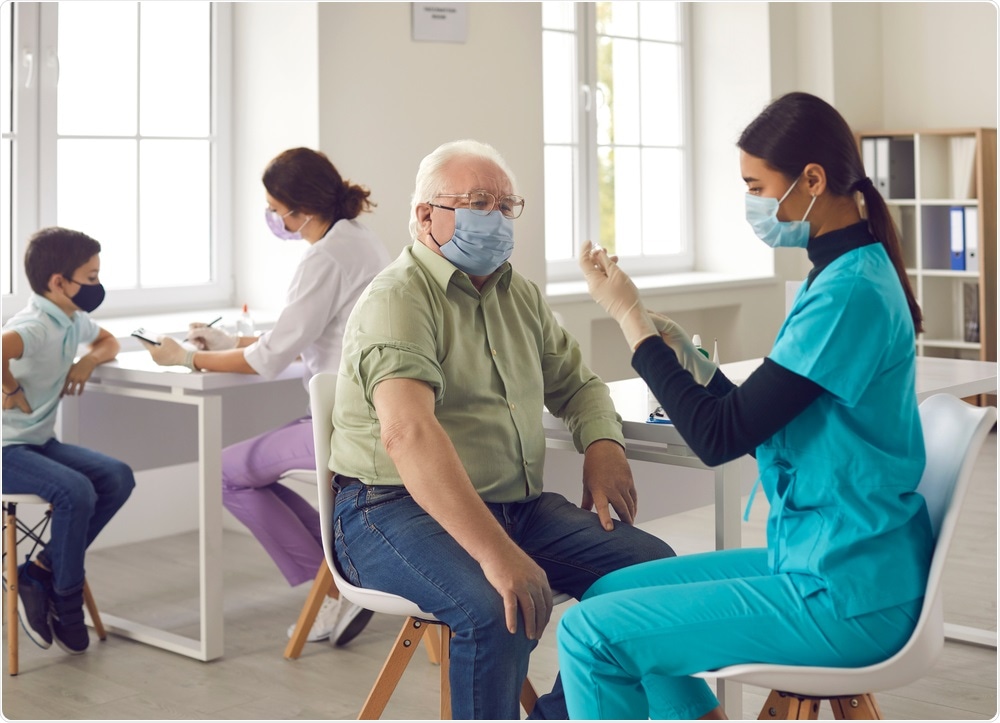As of June 15, 2021, over 61% of Israel’s population have received at least one dose of the coronavirus disease 2019 (COVID-19) vaccine. Israel’s ambitious vaccination campaign has significantly reduced the number of new positive cases across all age groups.
During the course of their vaccination campaign, Israel experienced two unique and major phases that have been referred to as the transition phase and the immunity phase. During the transition phase, the number of new COVID-19 cases dropped significantly among vaccinated individuals but continued to increase among those who had not yet received the vaccine. Comparatively, the immune phase was defined as the period in which a drop in new COVID-19 cases was observed across all communities, regardless of their vaccination status.
 Study: BNT162b2 mRNA vaccinations in Israel: understanding the impact and improving the vaccination policies by redefining the immunized population. Image Credit: Studio Romantic / Shutterstock.com
Study: BNT162b2 mRNA vaccinations in Israel: understanding the impact and improving the vaccination policies by redefining the immunized population. Image Credit: Studio Romantic / Shutterstock.com

 *Important notice: medRxiv publishes preliminary scientific reports that are not peer-reviewed and, therefore, should not be regarded as conclusive, guide clinical practice/health-related behavior, or treated as established information.
*Important notice: medRxiv publishes preliminary scientific reports that are not peer-reviewed and, therefore, should not be regarded as conclusive, guide clinical practice/health-related behavior, or treated as established information.
Currently, public health professionals are looking to better understand the different factors, aside from vaccinations, that have contributed to this drop in cases. In doing so, these professionals hope to identify different methods that can be used to minimize hospitalizations and overall COVID-19 positivity rates in other countries around the world.
In a recent study published on the medRxiv* preprint server, a group of Israeli researchers conducted an observational analysis on COVID-19 data that included over 12,000,000 polymerase chain reaction (PCR) tests from 250 different cities in Israel. The researchers examined the effect of the COVID-19 vaccination campaign on these Israeli cities with distinct demographic and ethnic characteristics. They also performed a simulation of various vaccination campaigns to identify the optimal policy.
When is herd immunity reached?
The current study found that cities with younger populations experienced a reduction in the number of new positive cases early on in Israel’s vaccination campaign as compared to cities that were predominantly occupied by older populations. This decrease was related to the median age alone rather than any other factors like the population sector or socioeconomic status of the population.
Interestingly, the researchers found that the number of new COVID-19 cases plateaued at different points based on the age of the population and their immunization rates. More specifically, cities with younger populations reached this plateau at 50% immunization, whereas cities with older populations instead reached this plateau later, when about 70% of their population was vaccinated.
This finding, therefore, contradicts the common belief that 65-70% of the population must be immunized in order to achieve herd immunity. To this end, the researchers found that the establishment of herd immunity instead relies more heavily on the percentage of susceptible individuals that are present in a given population.
Who should be vaccinated first?
The researchers also simulated 4 different vaccination policies - young to old, old to young, triangle, and all ages – with the help of stochastic implementation of the extended Seir model. They found that the final number of cases is lower when the positive impact factor is prioritized – for example, the younger population first and the older population later.
However, the number of hospitalizations is more complicated, as it appears to be more dependent on the vaccination rate. Overall, not prioritizing ages was found to reduce hospitalizations while the young to old policy has the potential to instead increase hospitalization rates. Considering both factors, the authors conclude that vaccinating all ages simultaneously results in a better outcome compared to other policies.
Study takeaways
The current study’s findings agree with those of a previous study that was conducted in Israel two months after the beginning of this nation’s vaccination campaign. To this end, the previous study showed that the decrease in clinical measures occurred after more than 50% of the population in a given age group got the first dose of the vaccine or had previously recovered from COVID-19.
Another finding that was similar between the two studies was that the effect of the vaccination campaign was higher in cities and geographical areas in which a greater percentage of people were vaccinated earlier.
“These findings not only affect our understanding of community-immunity but might also help estimate the timing in which other cities, that have only started vaccinating, will reach community-immunity.”
Based on these results, it is clear that vaccinating the elderly population is crucial for relieving the burden on hospitals. Comparatively, this research demonstrates that vaccinating the younger population also helps to contain viral transmission and reach community-wide immunity.
Overall, the findings of the current study reveal the impact that a country’s age structure has on the success of the vaccination campaign, as well as the need to redefine the vaccinated population that leads to community immunity.
“We believe our analysis can assist other countries to better predict the outcome of vaccinations on their COVID-19 cases and also improve their vaccination policy.”

 *Important notice: medRxiv publishes preliminary scientific reports that are not peer-reviewed and, therefore, should not be regarded as conclusive, guide clinical practice/health-related behavior, or treated as established information.
*Important notice: medRxiv publishes preliminary scientific reports that are not peer-reviewed and, therefore, should not be regarded as conclusive, guide clinical practice/health-related behavior, or treated as established information.